Bending the Curve Toward Justice
I met Stacey Cram at Lagos, Nigeria at paralegal training by JEI/IWEI and I learnt one thing from her. And that is the secret to service. Stacey Cram is policy Director, Namati. She first wrote about it on Namati website.
SHE WROTE
It was in a small kitchen in Transylvania when I first felt the sting of injustice. I was sixteen, sitting across the table from Eta, a retired doctor in her 80s whose twinkly eyes and cheeky laugh reminded me so much of my grandmother. We sat chatting and she told me how much she loved talking with young people and how she would have loved to have had children of her own, “sadly, not possible because of the sterilizations”. She noted the shocked look on my face and met it with a smile, a squeeze of my hand, and the push of a second slice of plum cake onto my plate.
Eta was a survivor of Auschwitz and I was there to document her story. She continued to tell me how “that so-called doctor” Joseph Mengele had chosen her for his sterilization program and ordered 10 members of her family to the gas chambers. I listened, growing angry at the now-familiar story of the few neighbors who turned against her, the many more who turned a blind eye, and at the system which made this injustice legal. She had no anger left but she was worried the world would forget her family’s story. I promised her I would not.
I have carried Eta with me since that day, but in the last 12 months she has been all the more present as every day I feel that sting of injustice. With politicians scapegoating complex issues on minority groups, increases in vigilante justice, the birth of “alternative facts” and too many silently watching these events unfold, it is hard not to make comparisons between today and Europe in the 1930s.
Injustice is not new, but rather than making progress towards solving the issues, we are seriously at risk of sliding backward. In 2011, the United Nations estimated that 4 billion people lived outside of the protection of the law. Around the world, millions of people were unable to secure citizenship, healthcare or an education, others had their land stolen or destroyed by corporations or man-made environmental issues. What united them was a routine denial of their rights and an inability to access legal support.
In the years since, the world made significant strides towards increasing justice, culminating with the adoption of the Sustainable Development Goals (SDGs) in September 2015, which guaranteed “equal access to justice for all”. This was the first time that the global community acknowledged that justice was central for sustainable development and economic growth.
Then 2016 happened.
With the refugee crisis growing in Europe we have seen many aid budgets reduced or reallocated to domestic refugees and vital new funding needed for justice has not materialized. With ‘America First’ policies we seem to have lost a strong and powerful ally for extending access to justice globally. In post-Brexit Britain, the government has recommitted to a 0.7% aid budget but it is unclear if the UK will prioritize fighting injustice abroad over negotiating new trade deals. And with elections in France, the Netherlands, and Germany this year, populist movements may gain even greater ground. 2017 looks set to be another difficult year.
Populist leaders often run on the promise of addressing injustice and reducing inequality, but we know this to be a false promise. Instead, populist leaders reduce civil liberties and empower a small, elitist class who pass laws that codify injustice. A functioning democracy which serves the needs of the people requires accessible and effective justice systems at every level of society. No one leader can deliver justice; we need millions of activists, community paralegals, lawyers, civil servants and government officials offering a spread of legal remedies. Around the world today, these are the people protecting and empowering their neighbors to understand, use and shape the law to reduce corruption and reform systems. Justice needs these people as much as people need justice.
Justice needs Hassan a 78-year-old man from Tawarka Bay, a small island off the coast of Lagos, who in his retirement years has trained as a community paralegal to fight against eviction notices illegally issued to his community.
Justice needs Marita, a dedicated US civil servant safeguarding funds in legislation to ensure immigrants do not lose access to legal aid with the new administration. Justice needs Ken and Elizabeth, respectively first and last term politicians in Kenya and the US, neither one need make a fuss or fight for the poor and the marginalized, but they do. They listen to slum dwellers and water protectors instead of their party, corporations, or lobbyists.
Justice needs the nameless Polish lady who passed a piece of soap through a barbed wire fence to Eta with a note saying “we are here for you”.
Justice needs the millions of people who marched to stand up and say that what is happening today is not normal.
Justice needs you.
It can feel overwhelming to know where to make an impact. But now is not the time to look away. The fight for justice has never been an easy one – “the arc of the moral universe does not just naturally curve toward justice; we must bend it”.
We have a long road ahead but some key priorities I see are:
- we must build a vibrant global justice movement which brings together new activists with those already doing this work to learn from and support each other;
- we need legal providers to protect people when their rights are violated and fight back against discriminatory legislation;
- we must support and recruit more individuals in office who will put conscience ahead of protocol or re-election;
- we need government, old allies, and new leaders, to prevent any slide backs on justice – the Dutch reaction to the global gag order is a wonderful example of a country taking a stance to protect women’s health;
- we need investment from governments, philanthropists, and the private sector to support this movement which is already chronically underfunded; and
- we need fresh and innovative ideas and leadership to drive forward this movement.
I know the years ahead remain unknown, but with Hassan, Marita, Ken, and Elizabeth and the many millions more out there, I feel confident we will move in the right direction.
And on days when it seems too much, find an ally, meet their eye and smile. If that ally is me, I promise I will offer you some plum cake. The next day, we will continue the fight together.
https://namati.org/bend-curve-towards-justice/
www.namati.org
#justice #poorestpoor #paralegal
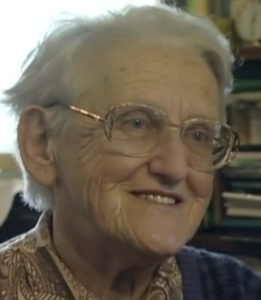
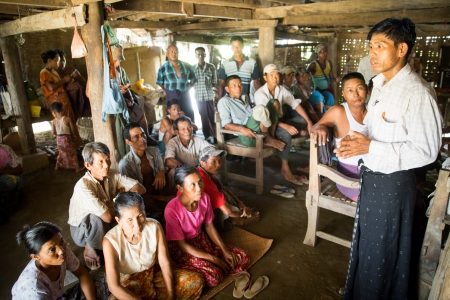
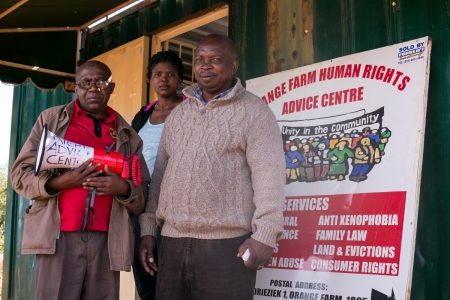
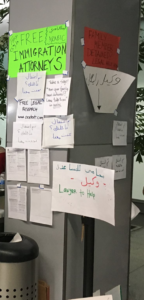

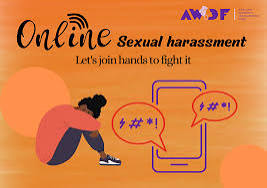
Comments
Post a Comment